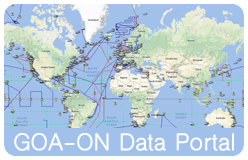Latin American Ocean Acidification Network
The formation of LAOCA (Latin American and Caribbean) Network became necessary to integrate the activities of the Latin American participants active in GOA-ON (Global Ocean Acidification Observing Network), since the small regional representation in this international network, the importance of the diversity of Latin American ecosystems, the richness of marine organisms in large coastal and oceanic regions vulnerable to the deleterious effects of increased carbon dioxide (CO2) absorption by oceans, and the social, economic, and political impacts of ocean acidification. Please see our Governance Plan for more information.
How to Join
New members interested in joining LAOCA need to read and agree to the terms within the Governance Plan and fill out this form.
Goals
- Synthesize and review the state of the existing information in studies of OA in Latin America
- Encourage the implementation, maintenance, and calibration of long-term data series for the parameters of the carbonate system in Latin America
- Train LAOCA members in the different lines of action (e.g., observation, experimentation, modeling)
- Standardize the measurement methods of the carbonate system and experimental protocols, in order the generate high-quality databases
- Consolidate the use of "good practice" protocols for the observation and experimentation of OA
- Constitute a node of articulation and communication between global (e.g., GOA-ON, IOCCP, OA-ICC), regional, and local OA programs
- Determine and evaluate local and regional OA scenarios for different marine ecosystems (e.g., estuaries, coastal zone, open ocean, OMZs etc.)
- Facilitate access to infrastructure and equipment among institutions and LAOCA member countries
- Facilitate the exchange of undergraduate and graduate students from institutions that form part of LAOCA
- Develop a scientific dissemination program to educate the general public on OA
- Coordinate efforts to promote collaborative projects between LAOCA member countries
- Promote the insertions of OA in the political agenda of LAOCA member countries, and even through the search for collaboration agreements between member countries
Co-Chairs
- Dr. Cecilia Chapa-Balcorta
University de Mar (UMAR)
Puerto Ángel, Oaxaca, México - Dr. Rodrigo Kerr
Universidade Federal do Rio Grande (FURG)
Brazil
Steering Committee
- Dr. José Martín Hernández Ayón
Universidad Autónoma de Baja California
Ensenada, Baja California, México - Dr. Nelson Lagos
Centro de Investigación e Innovación para el Cambio Climático
Facultad de Ciencias, Universidad Santo Tomás
Chile - Dr. Víctor M. Aguilera
Centro de Estudios Avanzados en Zonas Áridas
Coquimbo, Chile - Dr. Carlos Vergara-Chen
Universidad Tecnológica de Panamá
Panamá - Lic. Biol. Natalie del Carmen Bravo Senmache
Universidad Nacional Pedro Ruíz Gallo
Perú


